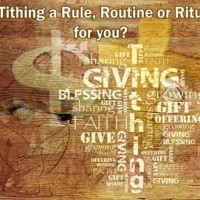

Read: 1 Corinthians 16:1-2 |
Last week we started the series “Is tithing a rule, routine or ritual for you?” This week, we will focus on “Is tithing a rule?” You might remember, we defined a “rule” as a prescribed guide for conduct or action. Good rules link to a value or reason for doing the rule.
Let us explore Old/New Testament scriptures related to tithing/giving. I recognize that not everyone will agree with everything written below, thus I have provided an abundance of scriptural references and sources. Please centralize your comments in the blog comment box below to allow others the benefit of your insight.
Old Testament – Age of Law – Tithe
Tithing was established under the age of Law in the Old Testament. God provided the Mosaic Law to Moses for Israel while he was on Mount Sinai. The purpose of the Mosaic Law was to provide a means to govern the life of Israeli theocracy – the priest nation. The law had three parts: the Ten Commandments, the ordinances and the festivals (Exodus 20—40; Leviticus 1—7; 23). [1,2]
Under the Law, tithing was considered an obligation – a rule (Nehemiah 12:44; Leviticus 27:30-33; Malachi 3:8-12). Some of the tithes, under the Law, ranged from 10% to 23.4% and only involved food, not money. Most theologians agree that there were three tithes, the purposes noted for the tithes include:
Several New Testament verses, point back to the law of tithing as well. Jesus told the very religious Pharisees in Matthew 23:23 / Luke 11:42 that they “ought” to have tithed. In other words, it was obligatory on all Jews still under the age of Law, and thus binding.[3] Clearly, tithing was an Old Testament rule under the Age of Law.
New Testament – Age of Grace – Give
The New Testament does not state that tithing is a rule. In fact, it only mentions, “tithing” as a reference to the Age of Law practice. The death of Christ inaugurated the New Covenant and the age of Grace, thereby bringing about a change in the Law (Romans 7:6-7; John 1:17; Hebrews 8:13; Colossians 2:14).
The New Testament, after the death and resurrection of Christ, does clearly say that we should give of our financial resources. Some of the purposes noted for our giving include:
The New Testament points out in 1 Corinthians 16:1-2 and 1 Corinthians 9:6-7, that if we give sparingly or bountifully, we will reap according to what we give. Thus, we have a free will to give out of our love for the Lord. When we give out of love, our giving will be cheerful. The mandate to give is clear in the New Testament, but it is not listed as a requirement. [4]
Free-will Giving
In the age of Grace, we give of our Time, Talent and Treasure as God has purposed in our hearts. The freedom of free will giving however can cause anxiety and confusion because we seek a norm or a guideline.
Some have chosen to combine the Old Testament law to tithe with the New Testament free will. The combination is termed free will tithe/giving by scholars. Free will giving often uses the Old Testament tithe of 10% as a guideline or baseline for giving back to God with our free will.
In fact, the combination could be called a free-will rule and is linked to the value of honoring God with our giving and providing for those who labor in the Church and those in the community. God loves and bountifully blesses those who cheerfully exercise their free-will to give back to God.
Outline:
Overview
Is Tithing a “Rule” for you?
Is Tithing a “Routine” for you?
Is Tithing a “Ritual” for you?
Questions:
1.Discover –
A. How did you answer when asked is tithing a rule for you?
B. How do you feel when you miss an opportunity to “give”? Does it affect you?
2.Develop –
A. How has your view of giving or tithing changed as you have grown in Christ?
B. If you are a free will giver, can you hear God’s voice clearly, when you begin to “purpose in your heart” what to give.
3.Demonstrate –
A. In your family, is everyone required to give a certain amount or left to their free will? If they decide to give nothing, what do you say?
B. How cheerful are you when placing your offering in the plate?
Other notable Scriptures:
References and Notes:
[1] – Tod Kennedy, “Doctrine: Mosaic Law”
[2] – S. Michael Houdmann “What is the purpose of the Mosaic Law?”
[3] – Messianic Jews today do not believe that the “age of the Law” has ended for Israelites who trust in Jesus as Messiah. They continue to keep the Mosaic law except for those laws related to sacrifice.
[4] – Joel Parker, “Tithing in the Age of Grace”
Age of Grace:
Luke 22:20 – “…this is the new covenant in My blood, which is shed for you”
Hebrews 8:7, – “ For if that first covenant had been faultless, then no place would have been sought for a second.”
Ephesians 2:15 – “ having abolished in His flesh the enmity, that is, the law of commandments…”
Hebrews 7:12 – “For the priesthood being changed, of necessity there is also a change of the law.”
Support the poor and down trodden:
Acts 11:27-39 – Give according to their ability
Acts 2:44-45 – …sharing with all, as anyone might have need
I John 3:17 – … let us not love with word or with tongue, but in deed and truth.
Luke 12:33-34 – … For where your treasure is, there will your heart be also.”
Ephesians 4:28 – …share with those in need

do you mind if I tweet this page?
No problem, thanks